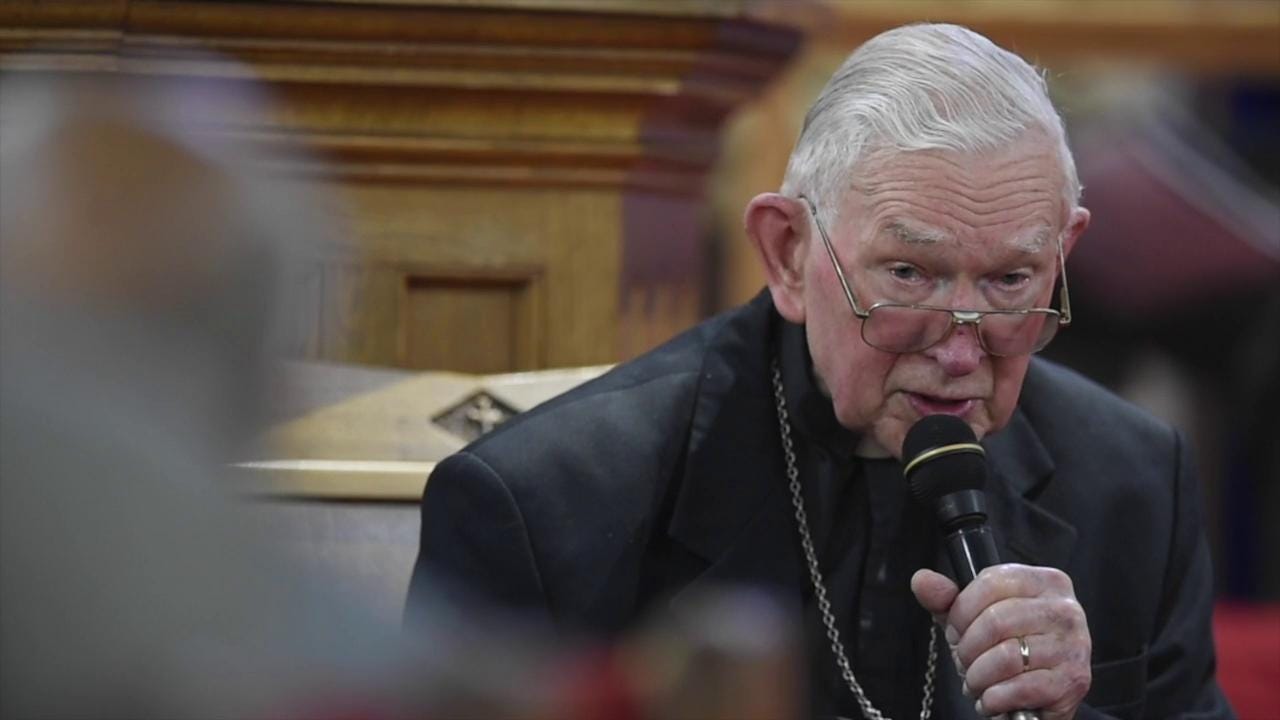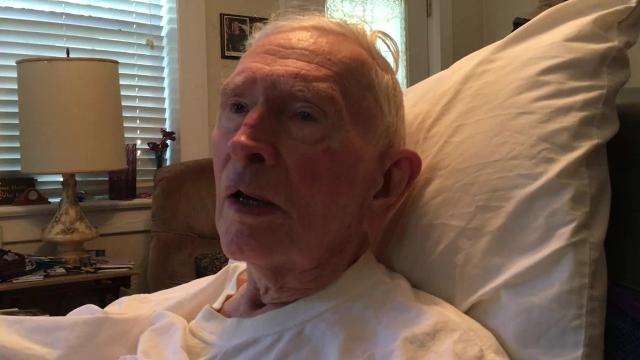Robert Graetz, the white minister who helped organize 1950s Montgomery Bus Boycott, dies at 92

Rev. Robert Graetz speaks about his work in Civil Rights
Rev. Robert Graetz speaks about his work in Civil Rights
The Rev. Robert Graetz, whose support of the 1955-56 Montgomery Bus Boycott made him a target of segregationists and sparked a career dedicated to social justice, died Sunday, his daughter Meta Ellis said. He was 92.
Graetz had been in hospice care.
Graetz, who ministered to the majority-Black Trinity Lutheran Evangelical Church in Montgomery, Alabama, helped organize the early stages of the boycott and helped drive people to and from work.
Graetz was the only white clergyman to support the boycott, and like other participants in the boycott, the reverend and his family persisted in the face of harassment, terrorism, and death threats that extended to their preschool children. Vandals poured sugar in their gas tank; slashed their tires and sprayed acid over their cars. White students on segregated school buses shouted "n---r lover" at Graetz and his wife, Jeannie, as they walked the street.
The family home was bombed twice, and while arrests were made, no one was ever convicted. Graetz often became emotional remembering the bombings in later years.
“People often said we had courage,” he said in 2001. “There were times when I was scared to death.”
Robert Graetz: A son of West Virginia
Robert Graetz was born on May 16, 1928, in Charleston, West Virginia. His father worked as an engineer for the Libbey-Owens-Ford Co., a glass manufacturer. In the mid-1940s, Graetz entered Capital University in Bexley, Ohio, where he helped organize a “campus race relations club.” Walter White, the longtime leader of the National Association for the Advancement of Colored People (NAACP), once spoke to the club and said race relations were improving because of the growing presence of whites in civil rights battles.
“Naturally I just beamed,” Graetz told the Advertiser in 1956, “because that depiction really fit me.”
The Lutheran Church faced a shortage of Black clergy in the 1950s, and Graetz was asked to minister at majority-Black churches. He started as a student pastor at Community Lutheran Church in Los Angeles in 1952. After earning a divinity degree from what is now Trinity Lutheran Seminary in Columbus, Ohio, Graetz went to the 210-member Trinity Lutheran Church in Montgomery in June 1955.
The church also sponsored meetings of the NAACP Youth Council, through which Graetz met Rosa Parks.
“When we met Rosa, we just fell in love with her,” Graetz said in 2015. “She was such a great lady, and so brave. She could really lead those kids and they responded to her.”
The Montgomery Bus Boycott
Graetz had spent barely six months as the pastor of Trinity Lutheran Evangelical Church in 1955 when Black leaders in the city organized the boycott following Parks' arrest on Dec. 1. The Sunday after the arrest and first organizational meetings, Graetz encouraged his congregation to unite behind the protest.
“Let’s try to make this boycott as effective as possible because it won’t be any boycott if half of us ride the buses and half don’t ride,” Graetz told the congregation. “So if we’re going to do it, let’s make a good job of it.”
From 6 a.m. to 9 a.m. each day, he drove a Chevrolet in support of the boycott, shuttling as many as 50 people a day between home and work.
As a member of the Montgomery Improvement Association, Graetz organized car pools and raised money to pay for gas and automotive expenses.
While the Graetzes were not the only white people involved in the boycott — Clifford and Virginia Durr provided legal and financial support — the young couple were the only white members of the clergy to publicly support it. Graetz wrote letters to fellow clergymen on stationery with a quote from Acts 8:26 (“And the Angel of the Lord spake unto Phillip saying: ‘Arise, go toward the South’”), asking them to consider this matter “prayerfully and carefully, with Christian love. Our Lord said, ‘Inasmuch as ye have done it unto one of the least of these my brethren, ye have done it unto me.’”
He was not successful. The association representing white ministers in Montgomery refused Graetz’s invitation to a talk from the Rev. Martin Luther King about the boycott.
Montgomery's larger white community also shunned the Graetzes. As they endured vandalism and verbal harassment, Robert and Jeannie received notes suggesting that their young children could be shot while playing outside. Family members suggested sending the children out of state; they refused.
Law enforcement also targeted the minister. On Dec. 19, 1955, while picking up five passengers, Graetz was stopped by Montgomery County Sheriff Mac Sim Butler and accused of picking up passengers in a taxi zone. The sheriff ordered him to follow him to the county jail, where Graetz was placed in a deputy sheriff’s office.
A person who Graetz assumed was a deputy sheriff told him, "We like things the way they are here. We don’t want anybody trying to change them.”
“Arriving here, I realized I had no idea what it would be like to be Black and live life in daily repression,” Graetz said in 1999. “I had no idea what it would be like to be told day after day and year after year that you are a nobody, that you have no value.”
The terror escalated in August 1956, a few days after the white ministers rejected Graetz's invitation to meet with King. Graetz was on a trip with his family and Rosa Parks at the Highlander Folk School, a training ground for civil rights activists in northeastern Tennessee, when he got a call from a reporter asking for a comment about his home being bombed.
It was the first news Graetz had about the attack, which tore the door off and shattered a window.
Far from providing support, city leaders went on the offensive. Mayor W.A. Gayle accused the Montgomery Improvement Association of setting off the bomb to boost interest in the boycott.
“We are inclined to wonder if out-of-state contributions to the boycott have been dropping off,” he said. “Perhaps this is just a publicity stunt to build up interest of the Negroes in the campaign.”
Graetz called the mayor’s comments “foolishness,” and King rejected all of Gayle’s premises.
The boycott ended in December after Montgomery’s bus system was ordered desegregated. The attacks did not. On Jan. 10, the Graetzes; their children, including their 9-day-old son and the Rev. Graetz’s mother were at home when a bomb exploded on their front lawn. Shortly afterward, a much larger bomb, consisting of 11 sticks of dynamite, was found, which could have killed the entire family had it gone off.
The Graetzes were one of several individuals targeted that evening. The Rev. Ralph Abernathy was also bombed, and several African-American churches were also targeted. Arrests took place, but no one was ever convicted.
After the boycott
In 1958, the family moved to minister at a Black church in Columbus, Ohio. Graetz worked in Ohio, Kentucky, California and Washington, D.C., where Graetz worked as a lobbyist for marginalized individuals for 13 years.
Robert and Jeannie Graetz returned to Montgomery in 2005 for the 50th anniversary celebrations of the Montgomery Bus Boycott, then moved to the city permanently in 2007. They worked for Alabama State University and held regular symposiums on civil rights issues. Graetz also wrote semi-regular columns for The Advertiser, part of the USA TODAY Network.
“What shall be done about the pockets of abject poverty scattered throughout our nation, disproportionately African-American?” he wrote in 2008. “Until progress has been made in ensuring more satisfying and productive lives to those who are the most vulnerable in our society, we cannot fully resolve the problems that divide our various groups.”
The couple remained politically active and outspoken, even as the Rev. Graetz entered hospice care. In 2011, they opposed Alabama’s House Bill 56, which criminalized undocumented immigrants’ lives in the state. Graetz also condemned white nationalist violence at Charlottesville in 2017 and sharply condemned President Donald Trump’s reaction to it.
Graetz is survived by his wife, seven children, 27 grandchildren, 13 great-grandchildren, and one great-great-grandchild.
“Some time ago I read that the first requisite of a successful missionary was that he become color blind,” Graetz told the Advertiser in 1956, near the start of the Bus Boycott. “I figured that the same was true of my work here. I know that I shall be criticized for my stand. I may even suffer violence. But I cannot minister to souls alone. My people also have bodies.”

Today's violence 'frightening,' says Robert Graetz
The Rev. Robert Graetz, a Civil Rights era veteran, speaks of today's racial tensions, saying, "One of the most frightening aspects of the violence that we're facing today is that this is looked upon more and more as normal pattern."
tinyurlis.gdu.nuclck.ruulvis.netshrtco.de
